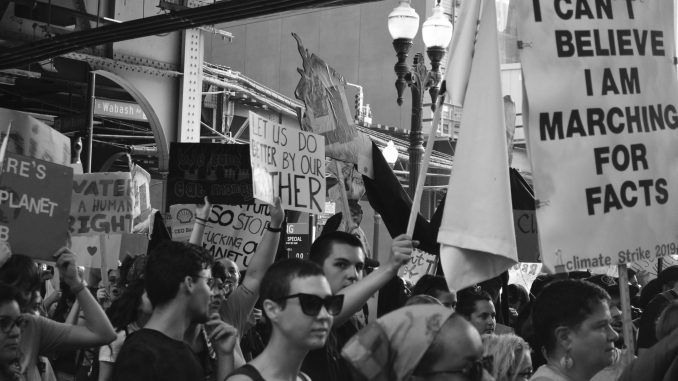
Written by Lesli Garcia, Staff Writer

“Politician Scapegoat. Students will get out and vote!”
“The people united. Will never be divided!”
“Save our planet!”
On Sept. 20, in cities around the world, students chanted as they held their signs high and proud for others to see. It was one of the biggest global climate change strikes to date. In Chicago, the event was organized by the Illinois Youth Climate Strike with an expected attendance of 3,000, but actual attendance exceeded those numbers.
The march began at 11 a.m. in Grant Park in downtown Chicago and continued toward Federal Plaza until 3 p.m.
Hundred of thousands of students marched on the street with anger and fear, anger directed at those in power who raised their fear with their actions according to these students.
“Ten years ago, maybe when I was in middle school, nobody was talking about this. None of my peers were talking about this,” said Maddie Ortega, a University of Illinois-Chicago student.
Ortega told a Pulse reporter, who attended the event, that adults aren’t the only ones talking about climate change now.
“It’s kids talking about it too,” she said.
Many of the speakers at the protest pointed to those in power who should be voted out of office for not addressing the global issue that is terrifying so many students. The fear and anger of hundreds of thousands of students could be visible and felt by many at the event.
They want change and they want it now.
That was last month in Chicago, but what about now and here in Kenosha. How do teens here feel about recent climate change protests by teens including 16-year-old Swedish activist Greta Thunberg, whose call for action has been heard around the world?
”I don’t really see much being done in my community. The most I’ve seen is biodegradable utensils at school, but that’s about it,” said Ava McHugh, 16, a General Studies junior studying at Indian Trail High School & Academy.
“I think the people who hold positions of power care more about money and the economy, instead of the planet,” McHugh said.
The impact from those protests may not be seen directly in sudden actions, but can be seen to have had affected the mindset of students and led some to want to take a step forward to see change.
“I have ideas to form a new club specifically to do research on current problems with the environment,” said Kali Aver, a Medical Science senior at Indian Trail High School & Academy. “forming teams to go pick up garbage in town, and maybe even inviting guest speakers to teach us more.”
Although recent protests haven’t prompted dramatic changes yet, the marches and youth activism have spurred some students to take action toward improving the environment and fighting climate change.
